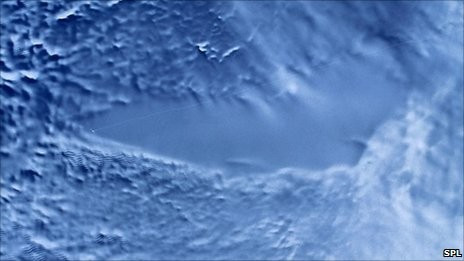Russian Scientists Claim to Have Found New Bacterial Life in Antarctica's Lake Vostok
Russian scientists believe they have found a type of bacterial life form previously unknown to mankind. The BBC reports the scientists were drilling into the sub-glacial Lake Vostok in Antarctica when they made the discovery.
"After putting aside all possible elements of contamination, DNA was found that did not coincide with any of the well-known types in the global database," Sergei Bulat, from the genetics laboratory at the St Petersburg Institute of Nuclear Physics, explained.

A report by Russian news agency RIA Novosti explained that seven samples of the bacteria were found in frozen water on the head of the hot water drill used to gain access to the lake. The scientists had to drill through a sheet of ice approximately 3.5kms thick.
Bulat also confirmed the samples of bacteria were never more than 86 percent compatible with the DNA of any known organism. Traditionally, a match of under 90 percent DNA is considered enough to indicate a new species.
"If it were found on Mars, people would call it Martian DNA. But this is DNA from Earth," Bulat added.
However, attempts, so far, to build a phylogenetic tree for the samples (an exercise in locating and placing the sample in the list of known organisms and identifying connections) have failed. More tests are being conducted but further samples are required to reach any conclusive statement.
Lake Vostok
The lake is located in the centre of the East Antarctic Ice Sheet and the entire region is one of the most inhospitable on the planet, with temperatures as low as -89C recorded in July, 1983.
The Russians set up Vostok Station in 1956 and initial observations suggested liquid underneath the ice cap. RIA Novosti's report states Russian scientists began drilling in 1989. The BBC claims a complete understanding of the sub-glacial features was revealed in the 1990s, with the help of radar imaging.
Lake Vostok has a total area of 15,000 sq km and is more than 800m deep. It is similar in size to Lake Baikal in Siberia or Lake Ontario in North America.
Finally, similar efforts are ongoing at least one other site. American scientists are investigating Lake Whillans and have also reported the discovery of microbial life. But given that Lake Whillans is not as isolated as Vostok, it is possible there is a degree of contamination in all discovered samples.
The British led an expedition to drill into Lake Ellsworth last year. However, the attempt to penetrate 3km of ice was called off after technical difficulties.
© Copyright IBTimes 2025. All rights reserved.




















